

InfoCuria. Language of document : ARRÊT DE LA COUR (troisième chambre) «Société de l’information — Droit d’auteur — Internet — Prestataire de services d’hébergement — Traitement des informations stockées sur une plateforme de réseau social en ligne — Mise en place d’un système de filtrage de ces informations afin d’empêcher la mise à disposition de fichiers portant atteinte aux droits d’auteur — Absence d’obligation générale de surveiller les informations stockées» Dans l’affaire C‑360/10, ayant pour objet une demande de décision préjudicielle au titre de l’article 267 TFUE, introduite par le rechtbank van eerste aanleg te Brussel (Belgique), par décision du 28 juin 2010, parvenue à la Cour le 19 juillet 2010, dans la procédure Belgische Vereniging van Auteurs, Componisten en Uitgevers CVBA (SABAM) contre Netlog NV, LA COUR (troisième chambre), composée de M.
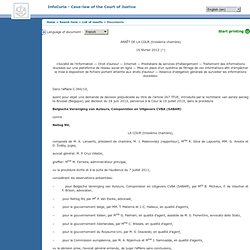
Avocat général: M. Greffier: Mme M. Vu la procédure écrite et à la suite de l’audience du 7 juillet 2011, considérant les observations présentées: ou. SABAM vs Netlog - another important ruling for fundamental rights. By EDRi SABAM (Société Belge des Auteurs, Compositeurs et Editeurs), the Belgian collecting society for music royalties, is in the spotlight again.
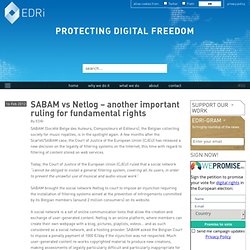
A few months after the Scarlet/SABAM case, the Court of Justice of the European Union (CJEU) has released a new decision on the legality of filtering systems on the Internet, this time with regard to filtering of content stored on web services. Today, the Court of Justice of the European Union (CJEU) ruled that a social network “cannot be obliged to install a general filtering system, covering all its users, in order to prevent the unlawful use of musical and audio-visual work”. Cp120011en. InfoCuria. Language of document : JUDGMENT OF THE COURT (Third Chamber) (Information society — Copyright — Internet — Hosting service provider — Processing of information stored on an online social networking platform — Introducing a system for filtering that information in order to prevent files being made available which infringe copyright — No general obligation to monitor stored information) In Case C‑360/10, REFERENCE for a preliminary ruling under Article 267 TFEU from the rechtbank van eerste aanleg te Brussel (Belgium), made by decision of 28 June 2010, received at the Court on 19 July 2010, in the proceedings Belgische Vereniging van Auteurs, Componisten en Uitgevers CVBA (SABAM) v Netlog NV, THE COURT (Third Chamber), composed of K.
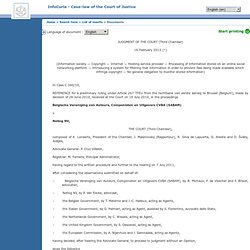
Advocate General: P. Registrar: M. Having regard to the written procedure and further to the hearing on 7 July 2011, after considering the observations submitted on behalf of: – Belgische Vereniging van Auteurs, Componisten en Uitgevers CVBA (SABAM), by B. Courts cannot force social networks to broadly monitor for illegal file-sharing, ECJ rules. The ECJ assessed EU laws on copyright and the enforcement of intellectual property rights as well as laws on the liability of service providers, data protection and privacy in communications.
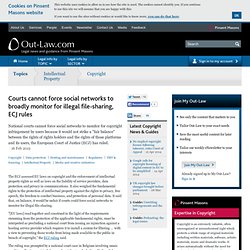
It also weighed the fundamental rights to the protection of intellectual property against the rights to privacy, free speech, the freedom to conduct business, and protection of personal data. It said that, on balance, it would be unfair if courts could force social networks to monitor for illegal file-sharing. "[EU laws] read together and construed in the light of the requirements stemming from the protection of the applicable fundamental rights, must be interpreted as precluding a national court from issuing an injunction against a hosting service provider which requires it to install a system for filtering ... with a view to preventing those works from being made available to the public in breach of copyright," the ECJ ruling said.
Online Copyright: EU Court of Justice Rules Out Private and Automatic Censorship. Paris, February 16th, 2012 – The European Court of Justice rendered another decision in defence of freedoms online.
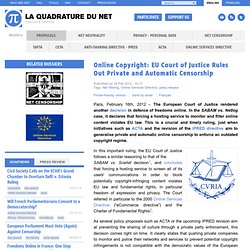
In the SABAM vs. Netlog case, it declares that forcing a hosting service to monitor and filter online content violates EU law. This is a crucial and timely ruling, just when initiatives such as ACTA and the revision of the IPRED directive aim to generalise private and automatic online censorship to enforce an outdated copyright regime. In this important ruling, the EU Court of Justice follows a similar reasoning to that of the As several policy proposals such as ACTA or the upcoming IPRED revision aim at preventing the sharing of culture through a private party enforcement, this decision comes right on time. “This ruling should sound as a call for EU policy makers to stop pushing for privatized censorship schemes under the guise of ‘cooperation’ between Internet actors and the entertainment industry.